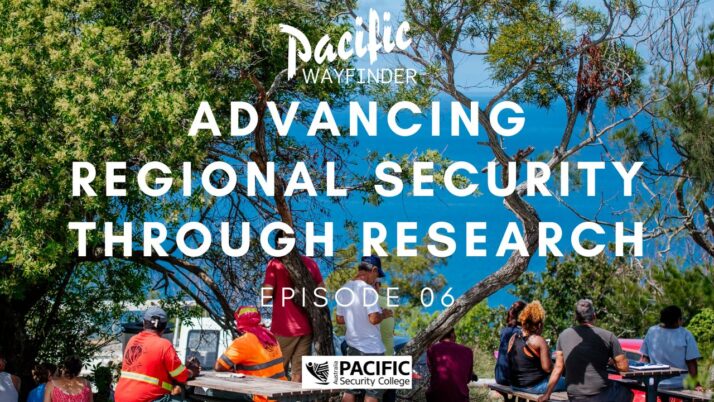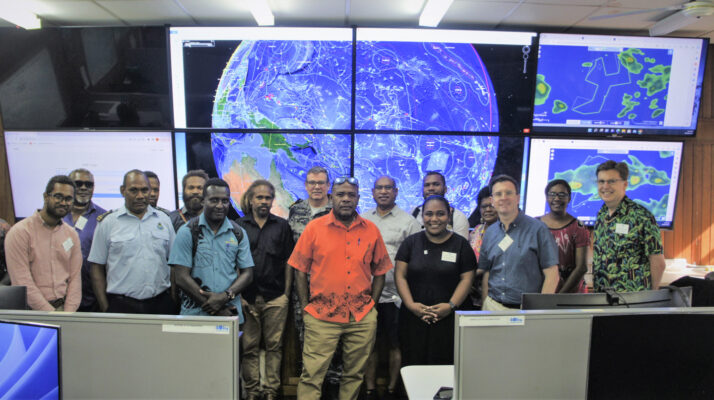Pacific Wayfinder: Advancing regional security through research

Pacific research that focuses on the intersectional nature of the Pacific region’s security challenges is vital, Eliorah Malifa writes for the Pacific Wayfinder series.
Security is at the forefront of discussions at local, national and regional levels. While the public’s focus is often drawn to a small number of high visibility security issues, the enactment of the Boe Declaration by Pacific Islands Forum leaders demonstrates that there is not one set of critical security issues in the Pacific, but many.
Recently, Regional Director for Polynesia at the Pacific Community Leituala Kuiniselani Toelupe Tago-Elisara and academic Salā Dr George Carter discussed how Pacific research is advancing regional understandings of security on the Pacific Wafinder podcast.
An understanding of the interconnectedness of security issues underpins much of the research that Pacific scholars are undertaking. As Leituala pointed out:
“We can’t talk about climate security without talking about human security and the same way where we can’t talk about climate and human security without talking about food security, without talking about water security, even our own health security and our broader social economic and environmental security.”
Fundamentally, these complex structures cannot be segregated, but require deep analysis and the development of a collective regional security framework to ensure positive progress.
Whilst COVID-19 has perhaps been the issue with the highest visibility in the region this year, security issues in the Pacific are intersectional and need to be viewed with a wider lens to understand the web of inter-related issues.
The core part of this framework will be a continued focus on the climate crisis, the greatest single common threat to the region. As many in the scientific community have identified, international organisations and governments will need to remain focused on the ongoing effects of the climate crisis for the region, despite the fact that the COVID-19 pandemic is continuing to wreak havoc in the Pacific Island region and around the world.
To build a greater understanding of the diversity of issues facing the region, forward-looking Pacific security research will have to be predicated on an understanding of the climate crisis’ ongoing impact, according to Carter.
“… we try and look into the future, what the Pacific will look like in 30 years, 50 years’ time, under 1.5 degree and through three degree increases. We look at the grim reality that coastal areas are inundated, that certain areas will be unlivable in terms of flooding,” he said.
This future-facing lens allows Pacific scholars a longer perspective, to theorise about potential future vulnerabilities in the region, and assist in building policy around these scenarios. This type of research allows academics to explore what could happen in future to arm policymakers with strategies to manage a range of security issues.
It is important that security researchers are able to share their knowledge in order to build a collective understanding of the threats facing the region, Leituala argued. This is not only a useful resource for Pacific governments but also vital for the future of a region that is facing increasing existential threats.
“The subsequent results of the actual research is really about sharing lessons, applying learning across countries and across cultures to really advance our own regional security agenda as a collective, but also as sovereign nations who are all working towards building a regional security framework that’s relevant to us, that’s grounded in our own Pacific concepts, and ensues sustainability and really the survival of our people,” she said.
It is important that Pacific scholars are researching the region’s security space, contributing essential perspectives and new research strategies to discussions often dominated by larger powers. Through this research, Pacific states can more effectively respond to the varied and interconnected threats they will face in the coming years.
Eliorah Malifa
This article is from our Pacific Wayfinder series, bringing you voices from the Pacific Island region. It is produced in conjunction with the Pacific Wayfinder podcast, produced by the Pacific Security College.
One comment on "Pacific Wayfinder: Advancing regional security through research"
Leave a Reply
More Stories

Security Snapshot - 28 Mar 2024
Pacific Security Snapshot | 28 March 2024
Summary ➣ Heavy rains, floods, landslides and earthquakes batter the region ➣ Pacific submissions to the International Court of Justice (ICJ) on climate change responsibility ➣ Elections across the Pacific prompting changes to diplomatic relations and security arrangements ➣ Challenges for women in politics Climate Security Lives have been lost in PNG after a series…

Latest News - 4 Oct 2023
Regional and National Security Architecture in the Blue Pacific, Honiara, Solomon Islands
Former deputy secretary of the Pacific Islands Forum Mr Peter Forau, and CEO of Solomon Islands Broadcasting Corporation and former adviser to the Pacific Islands Forum Johnson Honimae join the Pacific Security College’s workshop on Regional and National Security Architecture in the Blue Pacific The recently concluded Regional and National Security Architecture in the…







Good way of telling, and pleasant article to obtain information concerning my presentation focus, which i am going to present in institution of higher education.